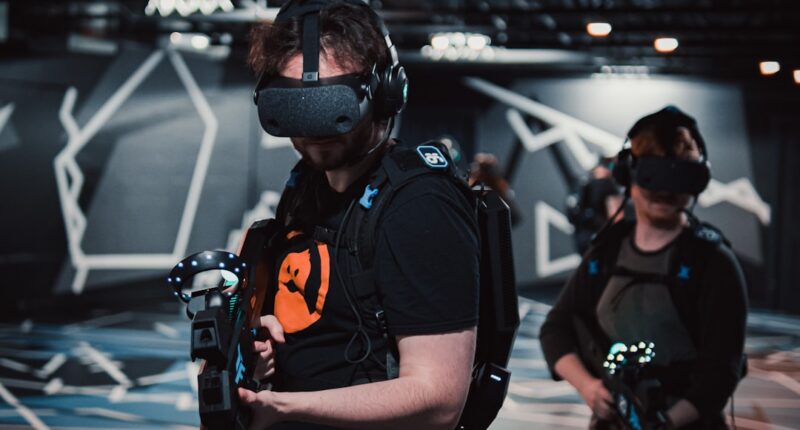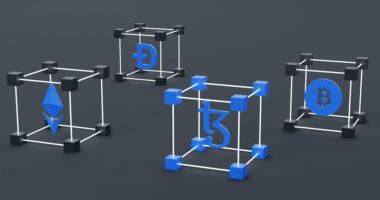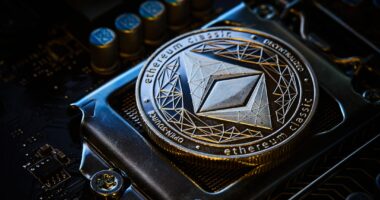NFT games, or non-fungible token games, are a novel form of gaming that utilizes blockchain technology to create unique digital assets within the game. Unlike traditional video games where in-game items are controlled by developers, NFT games allow players to own their in-game items as NFTs. These NFTs are stored on a blockchain, a decentralized digital ledger that ensures the ownership and authenticity of these digital assets are verifiable and cannot be duplicated or manipulated.
In NFT games, players can buy, sell, and trade their in-game items as NFTs on various online marketplaces, creating a real-world economy within the game. This introduces a new level of ownership and value to in-game items, as players can invest in their digital assets. NFT games often incorporate play-to-earn mechanics, allowing players to earn cryptocurrency or other rewards by playing the game and achieving certain milestones.
This has led to increased popularity for NFT games, as players can potentially earn real-world value through their in-game activities. NFT games span various genres, including role-playing games, strategy games, and virtual worlds, offering diverse experiences for players. With the advancement of blockchain technology and growing interest in digital ownership, NFT games have become a significant trend in the gaming industry, attracting both traditional gamers and cryptocurrency enthusiasts.
Key Takeaways
- NFT games are digital games that utilize non-fungible tokens (NFTs) to represent in-game assets and provide players with true ownership of their digital items.
- NFT games have the potential to revolutionize digital ownership by allowing players to buy, sell, and trade in-game assets with real-world value, creating a new economy within the gaming industry.
- The future of gaming with NFTs looks promising, as it opens up opportunities for players to monetize their gaming experiences and for developers to create more immersive and interactive game worlds.
- NFT games are revolutionizing the gaming industry by introducing a new level of player ownership and control over in-game assets, leading to a shift in the traditional gaming business model.
- While NFT games offer exciting opportunities, there are potential risks and challenges such as security concerns, environmental impact, and the potential for market manipulation and fraud.
The Impact of NFT Games on Digital Ownership
Empowering Players with Autonomy and Value
This shift in ownership has empowered players to buy, sell, and trade their in-game items as they see fit, creating a new level of autonomy and value within the gaming experience. Furthermore, the introduction of NFT games has blurred the lines between virtual and real-world economies. In-game items that hold value as NFTs can be bought and sold for real-world currency on various online marketplaces, allowing players to monetize their gaming experiences.
A New Paradigm for Gaming and Earning
This has opened up new opportunities for players to earn income through gaming, creating a paradigm shift in how games are perceived and experienced. Additionally, the concept of play-to-earn mechanics in NFT games has incentivized players to invest time and effort into the game, knowing that their achievements can translate into real-world rewards.
Redefining Digital Ownership and Its Future
The impact of NFT games on digital ownership extends beyond the gaming industry, as it has sparked discussions about the future of digital assets and ownership rights in the digital age. As NFT games continue to gain traction and popularity, it is clear that they have redefined the concept of digital ownership and have paved the way for a new era of ownership and value within the digital landscape.
The Future of Gaming with NFTs

The future of gaming with NFTs is filled with potential and possibilities that could revolutionize the gaming industry as we know it. As blockchain technology continues to evolve and become more accessible, we can expect to see an increase in the number and variety of NFT games available to players. This will open up new avenues for creativity and innovation within game development, as developers explore different ways to integrate NFTs into their games and create unique experiences for players.
Moreover, the concept of play-to-earn mechanics in NFT games is likely to become more prevalent, as players seek out opportunities to earn real-world rewards through their gaming activities. This could lead to a shift in how games are designed and monetized, with a greater emphasis on rewarding players for their time and effort. Additionally, we may see the rise of cross-platform compatibility for NFT games, allowing players to use their in-game assets across different games and platforms, further enhancing the value and utility of these digital assets.
Furthermore, the future of gaming with NFTs holds promise for fostering stronger communities and economies within games. As players have the ability to truly own their in-game items as NFTs, we can expect to see more player-driven economies emerge within NFT games, where players have a direct impact on the value and supply of in-game assets. This could lead to new forms of collaboration and competition within games, as players navigate the complexities of owning and trading digital assets within a virtual environment.
How NFT Games are Revolutionizing the Gaming Industry
NFT games are revolutionizing the gaming industry by introducing a new paradigm of ownership and value within games. Traditionally, game developers have held control over in-game items and assets, limiting the autonomy and value that players have within the game. However, with NFT games, players have the ability to truly own their in-game items as NFTs, giving them full control over their digital assets.
This has created a new level of ownership and value within games, empowering players to buy, sell, and trade their in-game items as they see fit. Moreover, NFT games have introduced play-to-earn mechanics, allowing players to earn cryptocurrency or other rewards by playing the game and achieving certain milestones. This has transformed how players engage with games, as they now have the potential to earn real-world value through their in-game activities.
Additionally, the introduction of NFTs has led to the creation of player-driven economies within games, where players have a direct impact on the value and supply of in-game assets. This has fostered new forms of collaboration and competition within games, as players navigate the complexities of owning and trading digital assets within a virtual environment. Furthermore, NFT games have sparked discussions about the future of digital ownership and have paved the way for a new era of ownership and value within the gaming industry.
As more developers and players embrace NFT games, we can expect to see a shift in how games are designed, monetized, and experienced. This revolution in the gaming industry has the potential to reshape how we perceive and engage with games, opening up new opportunities for creativity, innovation, and economic empowerment within the gaming landscape.
The Potential Risks and Challenges of NFT Games
While NFT games offer exciting opportunities for players to truly own their in-game items and earn real-world rewards through gaming activities, there are also potential risks and challenges associated with this emerging trend. One of the primary concerns is the environmental impact of blockchain technology used in NFT games. The energy consumption required for blockchain transactions has raised concerns about its carbon footprint and sustainability.
As NFT games continue to grow in popularity, it is crucial for developers to explore more eco-friendly solutions for blockchain technology to mitigate its environmental impact. Another potential risk is the presence of scams and fraudulent activities within the NFT space. The decentralized nature of blockchain technology can make it challenging to regulate and monitor transactions, leading to potential vulnerabilities for scams and counterfeit assets.
Players may encounter fake or stolen NFTs when buying or trading in-game items, which can undermine trust and confidence in the legitimacy of digital ownership within NFT games. It is essential for developers to implement robust security measures and verification processes to protect players from fraudulent activities. Furthermore, there are concerns about the speculative nature of NFTs within gaming communities.
The volatile nature of cryptocurrency markets can lead to fluctuations in the value of in-game assets, creating uncertainty for players who invest time and resources into acquiring these assets. Players may face financial risks if they are not well-informed about the market dynamics of NFTs within games. It is important for developers to provide transparency and education about the risks associated with owning and trading NFTs within their games to empower players to make informed decisions.
The Role of Blockchain Technology in NFT Games

Ownership and Security
This technology allows players to truly own their in-game items as NFTs, as each asset is uniquely identified on the blockchain with its ownership history verified through cryptographic signatures.
Smart Contracts and Automation
Moreover, blockchain technology provides a framework for creating smart contracts that govern the rules and conditions for owning and trading NFTs within games. Smart contracts automate the execution of transactions based on predefined criteria, ensuring that ownership rights are upheld without the need for intermediaries.
Interoperability and Innovation
Additionally, blockchain technology facilitates interoperability between different platforms and marketplaces for NFTs within games. Players can use their in-game assets across various games and ecosystems that support compatible blockchain standards, enhancing the utility and value of these digital assets. This interoperability opens up new opportunities for collaboration and innovation within the gaming industry, as developers explore ways to integrate NFTs into different gaming experiences.
The Growing Popularity of NFT Games in the Gaming Community
The growing popularity of NFT games in the gaming community is evident through the increasing number of players engaging with these innovative experiences. Players are drawn to NFT games due to the unique opportunities they offer for true ownership of in-game items as well as the potential to earn real-world rewards through gaming activities. The concept of play-to-earn mechanics has resonated with many players who see value in investing time and effort into games that offer tangible rewards.
Moreover, the introduction of player-driven economies within NFT games has fostered a sense of community and collaboration among players. As players buy, sell, and trade their in-game items as NFTs on various online marketplaces, they contribute to shaping the value and supply dynamics within these virtual economies. This has led to new forms of social interaction and engagement within NFT games as players navigate the complexities of owning and trading digital assets.
Furthermore, the growing interest in cryptocurrency markets has contributed to the popularity of NFT games among gaming communities. Players who are already involved in cryptocurrency investments are naturally drawn to NFT games due to their familiarity with blockchain technology and digital asset ownership. This convergence of gaming and cryptocurrency communities has created a unique intersection where players from different backgrounds come together to explore the potential of NFT games.
In conclusion, NFT games represent a significant evolution in how we perceive digital ownership within gaming experiences. With their potential to revolutionize the gaming industry by introducing new forms of ownership, value, and economic empowerment for players, it is clear that they have captured the attention and imagination of gaming communities worldwide. As developers continue to innovate and explore new possibilities with NFT games, we can expect to see further growth and diversification within this emerging sector of gaming.
If you’re interested in learning more about the potential impact of NFT games on the job market, check out this article on NFT Jobs. It explores how the rise of NFTs in the gaming industry could create new opportunities for employment and digital ownership.
FAQs
What are NFT games?
NFT games are video games that incorporate non-fungible tokens (NFTs) into their gameplay and economy. NFTs are unique digital assets that are stored on a blockchain and can represent ownership of in-game items, characters, or other digital assets.
How do NFT games work?
In NFT games, players can buy, sell, and trade NFTs representing in-game assets using cryptocurrency. These assets are stored on a blockchain, which ensures their scarcity and authenticity. Players can truly own and control their digital assets, and they can use them within the game or trade them with other players.
What are the benefits of NFT games?
NFT games offer players true ownership of in-game assets, allowing them to buy, sell, and trade digital items with real-world value. This can create new opportunities for players to earn money through gaming and can also foster a more immersive and engaging gaming experience.
Are there any concerns or criticisms about NFT games?
Some concerns about NFT games include the environmental impact of blockchain technology, the potential for scams and fraud in the NFT market, and the exclusion of players who may not have the financial means to participate in NFT gaming economies. Additionally, there are concerns about the potential for copyright infringement and legal issues related to the ownership of digital assets.
What is the future of NFT games?
The future of NFT games is still uncertain, but many believe that they have the potential to revolutionize the gaming industry by creating new opportunities for players to truly own and monetize their in-game assets. As blockchain technology continues to evolve and become more accessible, NFT games may become more mainstream and have a significant impact on the gaming and digital entertainment industries.





